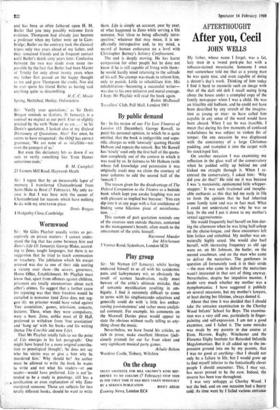Wormwood
Sir: Mr Giles Playfair usually writes so per- ceptively on prison matters: I cannot under- stand the fog that has come between him and Zeno's Life (31 January). George Blake, accord- ing to Zeno, taught languages, but there is no suggestion that he tried to teach communism or treachery. The jubilation which his escape aroused was due to one of their side scoring a victory over them—the screws, governors, Home Office, Establishment. Mr Playfair must know that, apart from offences against children, prisoners are totally uncensorious about each other's crimes. To suggest that a further cause for rejoicing was that their freedom would be curtailed is nonsense (and Zeno does not sug- gest it): no prisoner would have voted against 'free association,' games, television, concerts, lectures. These, when they were compulsory, were • a bore. Zeno, unlike most of D Hall, preferred to withdraw from 'free association' and 'bang up' with his books and his writing (hence The Crucible and now Life).
That Mr Playfair totally fails to see the point of Life emerges in his last paragraph: 'One might have hoped for a more original contribu- tion to penological thought'; 'he does not say who his victim was or give a hint why he murdered him.' Why should he? An author must be allowed to write the book he wants to write and not what his readers—or out reader—would have preferred. Life is not in- tended to be a study in penology, still less a
(16i. justification or even explanation of why Zeno murdered someone. Those are subjects for two totally different books, should he want to write
them. Life is simply an account, year by year, of what happened to Zeno while serving a life sentence. Not 'close to being affectedly intro- spective,' whatever that may mean, it is un- affectedly introspective and, to my mind, a record of human endurance on a level with Christopher Burney's Solitary Confinement.
The end is deeply moving. He has learnt compassion for other people but he does not know if he is still capable of living with them: he would hardly mind returning to the solitude of his cell. No attempt was made to reform him, only to punish. Little to rehabilitate him. His rehabilitation—becoming a successful writer— was due to his own initiative and moral courage. I hope Mr Playfair will read the book again.


































 Previous page
Previous page